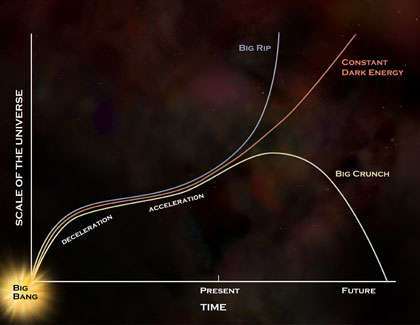
Dark Energy
Image: Dark energy is the name given to the cause of the observed acceleration in expansion of the Universe. Its effect became prominent only in the relatively recent past. The future evolution of the Universe depends on the properties of dark energy, which could allow for both exponentially accelerated expansion and complete recollapse of the Universe – in addition to continued ”moderate” acceleration.
Dark energy was first discovered in 1998, independently by the High-z Supernova Search Team and the Supernova Cosmology Project, leading to the 2011 Nobel Prize. A series of astronomical observations in the last decade plus have independently shown that the Universe is not a simple one consisting of only the material components that we know of on Earth attracting under gravity. Rather, some contrary component causing the Universe to expand faster must be added to make sense of the observations.
From the point of view of the equations of general relativity, such an additional component is described by the cosmological constant, with a positive value of approximately 0.3 (in natural units). A cosmological constant (multiplying the metric tensor) was introduced into general relativity by Einstein in 1918 in order to define a system of equations with a static, homogeneous, and isotropic solution – such as he believed was necessary at least as an idealization of the actual universe. Following the discovery of Hubble’s law and Lemaitre’s proposed big-bang cosmology, this motive fell by the wayside: Einstein subsequently considered it the ‘biggest blunder’ of his career, for his original equations for a homogenous and isotropic matter distribution predicted exactly such a big-bang cosmology.
The discovery of dark energy has dramatically changed the situation, but it need not signal a change to the law of gravity: it can be understood as a special type of energy-momentum density, to appear on the right-hand side of the field equations along with other sources of energy-momentum density. One candidate is a new particle (‘quintessence’) which could be added to the material content of the Universe to account for the accelerating expansion. Another candidate is that it is the zero-point energy of quantum fields, the existence of which is demonstrated in the Casimir effect. However, the natural scale of such an energy-density as set by quantum field theory is enormously higher than that set by the observed gravitational influence of dark energy.
We currently do not know what ‘dark energy’ is, but so far all evidence suggests that nothing more than a modification to the laws of gravity is needed, along the lines of Einstein’s original suggestion. Numerous ongoing and planned observational projects aim to illuminate its nature, considered by many to be the biggest puzzle in physics today.
Links
Scholarpedia: Cosmological constant >
Multimedia
BBC programmes on dark energy >
Brian Schmidt, ‘The accelerating universe and the hunt for dark energy’ >
Adam Riess, video and text of Nobel Prize Lecture 2011, ‘My path to the accelerating universe’ >
Fermilab: Dark energy survey >


